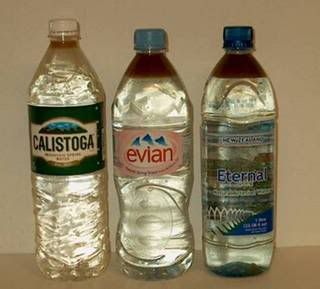
Exposing drinking bottles made from polycarbonate plastic to boiling water significantly speeds up the release of the chemical bisphenol A compared with room temperature water — and the amount of leaching is similar whether containers are well-used or brand new, researchers say.Uh huh. Right. The FDA and the EPA really have proved they have the public's safety at heart recently. Here is an article referencing research done between 1996 and 1998 which tested 708 Danish men reporting for a military medical examination:
The scientists at the University of Cincinnati found that when new and used polycarbonate drinking bottles were filled with boiling water and left for 24 hours, concentrations of bisphenol A (BPA) were released at rates up to 55 times more rapidly than with room temperature water.
Amounts of the chemical, which acts like the hormone estrogen, also leached out in higher quantities at the higher temperature, said study co-author Scott Belcher, an associate professor of pharmacology.
[snip]
Bisphenol A, widely used in such products as reusable water bottles, baby bottles, food-can linings and water pipes, has been shown to affect reproduction and brain development in animal studies.
"You could see that there are times when you would be putting hot liquids in these or boiling these or putting polycarbonate to these kinds of temperatures," Belcher said Tuesday from Cincinnati, noting that parents heat up plastic baby bottles and some people use water bottles for hot drinks.
While its effects are far from well-studied in humans, primarily because the chemical is so ubiquitous in daily life, there are concerns that BPA could contribute to some breast and prostate cancers as well as infertility in people.
[snip]
Plastic bottle maker Nalgene says on its website that BPA has been used around the globe for more than 50 years, noting studies from the U.S. Food and Drug Administration and the Environmental Protection Agency have shown the chemical doesn't pose a health risk.
It found that 43% of them had sperm counts low enough to lead to decreased fertility - in other words, to make it difficult for them to reproduce.A 2004 study finds that a projected 95% of Americans have bisphenol A in their urine. Bisphenol is used to make baby and beverage bottles, to coat teeth, and line the inside of food cans.They describe the sperm concentrations they found in the sample as "surprisingly low", and are at a loss to explain them.
"It remains to be seen whether these findings are generally applicable to populations of young men in the industrialised countries. Denmark seems to have relatively high rates of male reproductive abnormalities."
The World Wide Fund for Nature says it believes that a factor in the low sperm counts is exposure to endocrine-disrupting chemicals.
[snip]These are chemicals which can interfere with the normal functioning of the body's hormonal control systems and seriously affect health.
Known disrupters include some phthalates (used in many plastic goods, including toys), Bisphenol A (used in plastic bottles, the plastic lining of food cans, and elsewhere), and TBT, an anti-fouling paint for boats.
Elizabeth Salter, the head of WWF's European toxics programme, said the Danish study "proves that reduced sperm production is real and common".
Suggestions on how to lessen your exposure to BPA:
1. If you already own polycarbonate bottles, including the Nalgene bottles popular on college campuses, labeled #7 on the bottom, wash them by hand with mild dishwashing soap, not in the dishwasher, to avoid degrading the plastic and increasing leaching of BPA (see "Picnic Perfect Plastics").
Eight Ways to Avoid Harmful Chemicals from Cans and Plastic Bottles
2. Even plastic does not last forever. Look for cracks or cloudiness on your reusable clear plastic bottles. See The Green Guide's survey, "A Nalgene Bottle Poll."
3. Use glass baby bottles or plastic bag inserts, which are made of polyethyelene, or switch to polypropylene bottles that are labeled #5 and come in colors or are milky rather than clear.
4. Choose soups, milk and soy milk packaged in cardboard "brick" cartons, by Tetra Pak and SIG Combibloc, which are made of safer layers of aluminum and polyethylene (#2) and also recyclable.
5. Choose canned foods from makers who don't use BPA, such as Eden Foods (www.edenfoods.com), which sells certified organic canned beans and other foods.
6. Eat fresh foods in season and save the canned foods for convenience or emergencies. The exception is some canned fruit such as that found in smaller fruit-cocktail cans, which do not require a liner, according to the Can Manufacturers Institute.
7. Buy or can your own fruits and vegetables in safe glass jars. For more, see Amy's Green Kitchen "In a Summer Pickle".
8. Some wines have been found to contain up to six times the BPA of canned foods. While most wines probably don't, it's another good reason to drink in moderation.
No comments:
Post a Comment